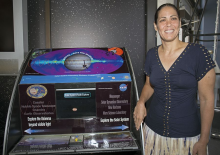Listening to the whispers from the stars
Submitted by Wilson Gonzalez-Espada on
A Nobel Prize with a Puerto Rican connection
Submitted by Wilson Gonzalez-Espada on
When technology jumps the gun
Submitted by Wilson Gonzalez-Espada on
Cuba faces vast land losses as sea levels rise
Submitted on 24 August 2013 - 12:49pm
This article is reproduced by CienciaPR with permission from the original source.
Report: Puerto Rico unprepared for climate change
Submitted on 24 August 2013 - 11:46am
This article is reproduced by CienciaPR with permission from the original source.
Phys.org
Submitted on 24 August 2013 - 11:43am
This article is reproduced by CienciaPR with permission from the original source.












